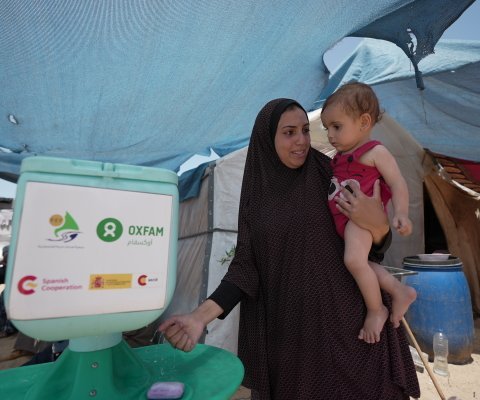Research
Search research reports
-
Research
Best and Worst States to Work in America - 2020
Each year, the Best States to Work Index ranks the US states on compensation and conditions for workers.

-
Research
Gender-Responsive Budgeting in Ghana: An analysis of GRB implementation and its existing and potential impacts on women small-scale farmers
Gender-responsive budgeting (GRB), also known as gender budgeting, is an approach to budgeting that takes into account the various needs of a diverse population by using an intersectional gender lens to respond to the different experiences of women, men, and gender-diverse groups. In addition to promoting more equitable budgeting outcomes, GRB requires that the budgeting process itself be inclusive and accessible to all. This study focuses on GRB in Ghana and how it does and could impact women small-scale farmers. The research was conducted by Oxfam, Ghana Trade and Livelihood Coalition (GTLC) and SEND Ghana, and included a literature review, interviews, and focus group discussions. The five areas addressed in this paper are: (1) the gender responsiveness of the budget process in Ghana; (2) systems and structures for GRB implementation; (3) best practices in GRB advocacy, particularly regarding agriculture budgets; (4) women’s engagement in the budget process; and (5) the budget’s responsiveness to the needs of women smallholder farmers. The aim is for these findings to contribute directly to GRB advocacy by NGOs in Ghana, as well as to provide useful insights for relevant government officials in Ghana and other GRB practitioners and advocates in other countries. Thus, this paper concludes with recommendations for the Government of Ghana as well as NGOs and civil society members in Ghana.

-
Research
Policy Landscape for the Scaling-Up of Agroforestry in Mali
Mali does not have a stand-alone, designated national policy or strategy to support and promote agroforestry. This report identifies barriers to agroforestry adoption, acknowledging that policy is one among numerous barriers. While there are policy gaps, Mali already has many policies supportive of agroforestry. However, implementation issues, as well as a disconnect between national policies and local conventions, pose significant challenged to the effectiveness of current and future policy initiatives.
The report offers recommendations designed to establish a national policy landscape that can scale up agroforestry and agroecological solutions: decentralization must be fully administered; women must be included in natural resource management decision making, and gender analysis should be better integrated into policies across the board; policies governing land titling and registration must be clarified and streamlined, and support for proper administrative management complying with those policies must be prioritized; forestry policies and regulations should be clarified and broadly communicated, and implemented; agricultural programs need to align their financing and priorities with their purported social and environmental objectives; and finally, fiscal and market policies should support agroecological production, and agroforestry solutions should be prioritized within climate adaptation efforts.
In addition to the Research Backgrounder, a Policy Brief is also available. Please see Downloads.

-
Research
Local Humanitarian Leadership in El Salvador
Since Hurricane Mitch struck in 1998, El Salvador has made significant progress in building local and national humanitarian capacity and leadership. This case study uses an “outcome harvesting” methodology to explore how it happened, and puts forward recommendations for the future.

-
Research
Best States to Work During COVID-19
When COVID-19 shattered the US economy, states across the country responded in wildly different ways. Oxfam assesses and ranks the states in a special edition of our Best States to Work Index.

-
Research
Caring Under COVID-19: How the Pandemic Is and Is Not Changing Unpaid Care and Domestic Work Responsibilities in the United States
Written by Brian Heilman, María Rosario Castro Bernardini, and Kimberly Pfeifer. Caring Under COVID-19: How the Pandemic Is and Is Not Changing Unpaid Care and Domestic Work Responsibilities in the United States, a new report by Oxfam and Promundo as part of MenCare: A Global Fatherhood Campaign, reveals findings from a rapid poll exploring the gendered and racial impacts of COVID-19 on care work. The report demonstrates how COVID-19 has brought an unprecedented crisis of care in the United States, with a particular workload being taken on by women as a group, and Black, Latinx, and Asian individuals.
This report provides six new insights on the unfolding crisis of care, along with PL+US highlighting the need for paid leave, policy changes that are intersectional and that account for and remedy existing inequalities, and better inclusion in decision-making of those individuals with a clear view of inequalities. This report is the first in a series of similar polls in the #HowICare Project, the Oxfam International report is also published and focused on these four other countries: UK, Canada, Philippines, and Kenya.



